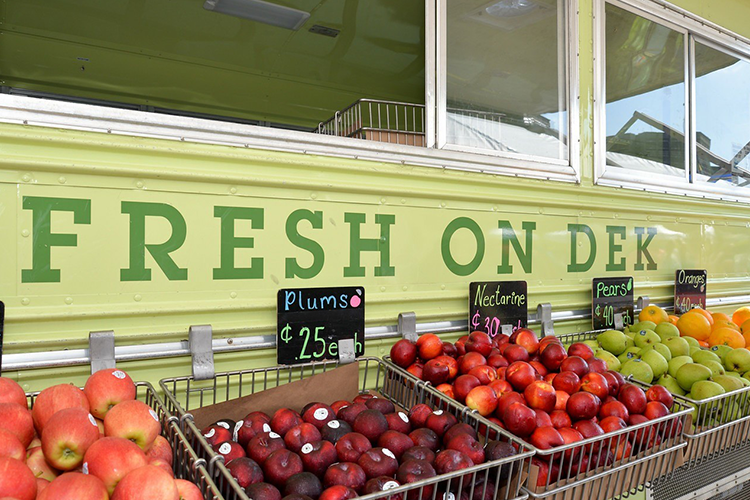Farmers markets play a crucial role in combating food deserts by providing fresh, locally sourced produce to communities that lack access to nutritious food. By bringing healthy options to neighborhoods with limited grocery stores, farmers markets help improve diet quality, reduce food insecurity, and promote overall community health.
Here are just a few examples of how land-grant universities are fighting food deserts with farmers markets:
Fresh on DeK Mobile Farmers Market | University of Georgia
Food insecurity affects physical and mental health. Many residents in food desert communities are forced to choose between healthy, nutrient dense foods or convenience foods. The University of Georgia Cooperative Extension Fresh on DeK Mobile Farmers Market targets communities without access to grocery stores within a one-mile radius. The mobile market provides fresh produce at low cost in strategic locations throughout the county, including recreation centers, senior communities, public libraries, churches, and community centers. Fresh on DeK also offers digital education, including weekly classes, food demonstrations, and healthy-living handouts.
The St. Helena Farmers Market, a Small Oasis in a Rural Food Desert | Louisiana State University
Food insecurity, defined as the lack of access to a reliable source of food during a given year, is high in St. Helena, one of Louisianas eight Florida Parishes. The St. Helena Farmers Market in Greensburg was started in 2018 as part of the LSU AgCenter’s healthy communities program to provide residents and visitors fresh fruits, vegetables, and proteins from local producers. The market also offers a SNAP matching program that gives customers who have electronic benefits transfer (EBT) a three-to-one match.
Beginning a New Farmer’s Market to Address Food Security in a Local Food Desert | Oklahoma State University
In 2022, the Oklahoma City Extension Office tackled food security by starting the East Side Fresh farmer’s market with a goal of increasing access to fresh, healthy food in a neighborhood food desert and providing more outlets for small and beginning farms to sell their products. The opening of the East Side Fresh Market was the culmination of a multi-year process to secure grant funding from the USDA, form a local advisory board to guide the process of starting a new farmers market, and navigating the regulatory hurdles to not only hosting a farmers’ market, but being able to accept federally and state funded participants such as those receiving Supplemental Nutrition Assistance.
Veggie Van takes on food deserts in Niagara County | Cornell University
The CCE Niagara Veggie Van program, started in 2015, is a mobile farmers market that brings locally grown fruits and vegetables to neighborhoods that lack access to fresh produce. The program has helped many residents, particularly retirees, who live off Social Security Income and do not drive, by providing them with a convenient and cost-effective way to access fresh fruits and vegetables. The program has provided more than 10,000 pounds of fresh produce to Niagara County communities, and on average, sees between 50 and 100 people per day, with about 10% of them being new customers. The Veggie Van sells produce from local growers including participants in the CCE Beginning Farmer Training Program.
Cover photo courtesy of DeKalb County Extension, University of Georgia.
More From: Cornell University, Farmers Market, Georgia, Louisiana, Louisiana State University, New York, North Central Region, Northeastern Region, Oklahoma, Oklahoma State University, Southern Region, University of GeorgiaShare this Post

